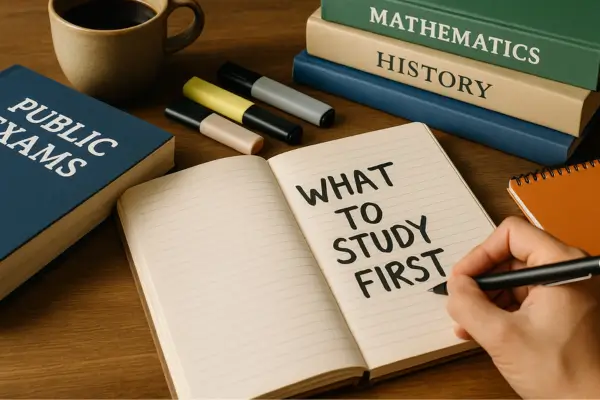Starting your journey toward public exam success from scratch can feel overwhelming. You open the syllabus, see dozens of subjects and hundreds of topics, and wonder: Where do I even begin?
Choosing the right starting point is crucial. It builds your foundation, creates momentum, and sets the tone for the rest of your preparation. In this article, you’ll learn a step-by-step method to prioritize what to study first when you’re starting from zero — and how to build a solid and confident path toward exam day.
Understand the Exam Requirements First
Before picking up any book, your first task is to understand the exam you’re targeting. Different public exams (civil services, police exams, administrative posts, health departments, etc.) have their own unique structures and priorities.
Carefully read the official announcement or notice and gather details like:
- List of required subjects and topics
- Relative weight or importance of each subject
- Type and format of questions (multiple-choice, essay, oral tests)
- Any specific areas of emphasis (e.g., law, mathematics, language)
This initial step prevents wasted effort and ensures your energy goes toward what actually matters for the exam.
Start with Core and High-Frequency Subjects
Nearly every public exam includes core subjects that are tested heavily. These often include:
- Language Skills (Grammar, Reading Comprehension, Writing)
- Mathematics (Arithmetic, Percentages, Ratios, Algebra)
- Logical Reasoning (Puzzles, Sequencing, Critical Thinking)
- General Knowledge (History, Geography, Political Science)
- Current Affairs (National and International News)
Starting with these essential areas offers two key benefits:
- You cover a large portion of what’s usually on the exam.
- You gain skills that are transferable across different parts of the test.
Build Your Fundamentals First
When you’re beginning from zero, your primary focus should be building strong fundamentals.
For example:
- In mathematics, master basic operations before attempting complex algebraic questions.
- In language, focus first on basic grammar rules before jumping into essay writing.
- In general knowledge, cover essential world history before moving into detailed contemporary topics.
A weak foundation leads to constant struggles later on, so take your time mastering the basics.
Prioritize Subjects You’ll See Across Multiple Exams
If you are planning to apply for several different public exams, start with subjects that are common to many of them. This way, your preparation will serve you across multiple opportunities.
Subjects that are universally useful include:
- Reading comprehension
- Basic math and logical reasoning
- Constitution and citizenship laws
- Current affairs and events
This approach maximizes your return on study time.
Study the Easiest Topics First — Or the Hardest?
There are two main strategies here:
- Start Easy: Build momentum by covering simpler topics first. This approach helps boost confidence and establish a study routine.
- Start Hard: Tackle the most difficult subjects when your energy and motivation are at their peak at the beginning of your journey.
Which one is better?
It depends on your personality. If you need confidence quickly, start with easier material. If you’re highly motivated and ready for a challenge, starting hard can create major early progress.
Create a Simple, Flexible Study Plan
Don’t try to plan your whole preparation year in one sitting. Instead, design a simple starter study plan:
- Allocate 1–2 hours per day if you’re working, or 3–4 hours if you’re studying full-time.
- Divide the week: Language on Mondays, Math on Tuesdays, General Knowledge on Wednesdays, and so on.
- Reserve time for review and quizzes each weekend.
As you get more comfortable, you can adjust and intensify your schedule as needed.
Start Practicing Active Study Techniques
From the very beginning, use active learning techniques that boost retention:
- Summarize topics in your own words.
- Solve basic practice questions immediately after learning a topic.
- Create mind maps or flashcards for key concepts.
Passive reading is a trap. Engage actively with the material to fix it into long-term memory.
Don’t Obsess Over Covering Everything Initially
One mistake beginners make is trying to cover every topic perfectly from day one. This leads to:
- Frustration
- Burnout
- Incomplete understanding
Remember, the first pass through the material is about building familiarity, not mastering everything.
You will revisit topics during review cycles and strengthen them over time.
Incorporate Current Affairs Early
Many public exams have sections that test your knowledge of current events.
From the start:
- Read a daily newspaper or a reliable news app.
- Follow weekly news summaries focused on exam-relevant topics.
- Keep a notebook to summarize important events in bullet points.
This habit prevents the last-minute scramble to memorize months of news.
Start Mock Tests Early (Even If You Don’t Feel Ready)
One powerful tip: start doing practice tests early, even if you feel like you barely know anything.
Why?
- It familiarizes you with the exam structure.
- It reveals how questions are asked.
- It highlights your weak areas quickly.
Take one mock test per week, even if you score badly at first. Improvement will come with time.
Stay Patient and Focus on Progress
When starting from scratch, patience is your superpower.
Understand that:
- Mastery takes time.
- Some days will feel slow.
- Progress is not always linear.
Focus on building the habit of daily learning rather than expecting huge leaps immediately. Over weeks and months, your small daily efforts will compound into massive growth.
Final Thoughts: Smart Beginnings Lead to Strong Endings
Starting from scratch to prepare for public exams can be intimidating, but it also gives you the chance to build the right habits from the beginning.
By prioritizing core subjects, focusing on fundamentals, actively engaging with the material, and maintaining patience, you set yourself up not just to pass an exam — but to truly master the knowledge and skills you’ll need for your career.
Remember: it’s not about how fast you start, but how smart you build your foundation. Step by step, you’re moving toward your goal. Keep going! 🌟

